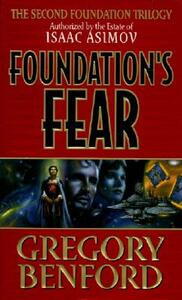Take a photo of a barcode or cover
challenging
slow-paced
Plot or Character Driven:
N/A
Strong character development:
No
Loveable characters:
No
Diverse cast of characters:
Yes
Flaws of characters a main focus:
Yes
I approached this book with considerable trepidation. I'm a big fan of Asimov's original Foundation Trilogy but was not overly impressed by his later additions to the series like Foundation's Edge where he attempted to tie the Foundation stories in with his robot stories.
So, knowing that this book took place prior to the setting up of the Foundations, that it featured robots and that it was written not by Asimov (for obvious reasons) but by Gregory Benford, who's books I had never read…..
I was, however, pleasantly surprised. This didn't strike me as a great original story, nor is it an Asimov Foundation book. What it is though is an entertaining story set in the Foundation universe and using familiar characters.
The story itself concerns the events in Hari Seldon's life just prior to his becoming First Minister. Specifically, his continuing development of psychohistory (which appears to be at a fairly advanced stage at this point) and the political machinations he becomes embroiled as he is drawn into politics
Various secondary strands pad out the book and the importance of some of them may not become completely clear until I have read the other two books in this trilogy.
Particularly intriguing to me was the initial appearance of the "sims" Voltaire and Joan, who engage in a most dramatic public debate. However, the rest of their plot arc was rather dull and the tie in with the main story seemed unconvincing.
Benford has a much more wordy writing style than Asimov and we get far more of what characters are thinking. We also get a fair amount of repetition. I'm not sure whether this is down to bad editing or was done because Benford thought the reader might have forgotten certain theories mentioned 100 pages earlier.
Purists may be upset by certain liberties that Benford has taken. For example the introduction of modern computers and cyberspace. The most glaring update must be replacing hyperspace ships with travel via wormholes.
To me getting upset about this sort of thing is rather missing the point. Asimov wrote roughly according to the science of the time and did update the Foundation universe himself in later stories. Not only that but as Benford notes in the afterword, Asimov was not terribly consistent about many aspects of the Foundation universe anyway.
This book does what it sets out to do, namely setup a trilogy of books which will try to answer some of the open questions about the Foundation universe. Already I am curious about just how the two Foundations get set up and exactly what role the robots play in this.
There are hints that the Robots "overseeing" isn't perhaps as snowy white and pure as one might have thought.
So, knowing that this book took place prior to the setting up of the Foundations, that it featured robots and that it was written not by Asimov (for obvious reasons) but by Gregory Benford, who's books I had never read…..
I was, however, pleasantly surprised. This didn't strike me as a great original story, nor is it an Asimov Foundation book. What it is though is an entertaining story set in the Foundation universe and using familiar characters.
The story itself concerns the events in Hari Seldon's life just prior to his becoming First Minister. Specifically, his continuing development of psychohistory (which appears to be at a fairly advanced stage at this point) and the political machinations he becomes embroiled as he is drawn into politics
Various secondary strands pad out the book and the importance of some of them may not become completely clear until I have read the other two books in this trilogy.
Particularly intriguing to me was the initial appearance of the "sims" Voltaire and Joan, who engage in a most dramatic public debate. However, the rest of their plot arc was rather dull and the tie in with the main story seemed unconvincing.
Benford has a much more wordy writing style than Asimov and we get far more of what characters are thinking. We also get a fair amount of repetition. I'm not sure whether this is down to bad editing or was done because Benford thought the reader might have forgotten certain theories mentioned 100 pages earlier.
Purists may be upset by certain liberties that Benford has taken. For example the introduction of modern computers and cyberspace. The most glaring update must be replacing hyperspace ships with travel via wormholes.
To me getting upset about this sort of thing is rather missing the point. Asimov wrote roughly according to the science of the time and did update the Foundation universe himself in later stories. Not only that but as Benford notes in the afterword, Asimov was not terribly consistent about many aspects of the Foundation universe anyway.
This book does what it sets out to do, namely setup a trilogy of books which will try to answer some of the open questions about the Foundation universe. Already I am curious about just how the two Foundations get set up and exactly what role the robots play in this.
There are hints that the Robots "overseeing" isn't perhaps as snowy white and pure as one might have thought.
It was ok. I was bored quite a bit...
I just started Foundation and Chaos and the difference in writing is startling.
I just started Foundation and Chaos and the difference in writing is startling.
This book was about 300 pages longer than it should have been. Entire sections of the book were pointless and very boring. Reading the chatpers with the "sims" were about as exciting as watching someone play the game of the same name...
Characters were very flawed too. Asimov describes Yugo as someone that is only interested in science, he has no political or other ambitions. For some reason, Benford turned him into an annoying Dahlite zealot.
The parts where he tried to explain the science was difficult to read. I understand that sci-fi is based on reality, but explaining something that doesn't exist in page after page of techno-jargon is not something I care to read about.
Characters were very flawed too. Asimov describes Yugo as someone that is only interested in science, he has no political or other ambitions. For some reason, Benford turned him into an annoying Dahlite zealot.
The parts where he tried to explain the science was difficult to read. I understand that sci-fi is based on reality, but explaining something that doesn't exist in page after page of techno-jargon is not something I care to read about.
What an odd book. I don't know that I expected it to be a carbon copy of one of Asimov's novels in the series, or even one that sounded like a Foundation novel, but what I found here was very different from my expectations.
For one thing, Foundation's Fear has better characterization than anything Asimov ever wrote. The closest I ever got to feeling for any of the characters was during Dors' death in Forward the Foundation, and even then, it was more about the sense of loss than it was about how well Asimov created the characters. Benford, though, delved deeply into not just Seldon's character, but also Dors', as well as (no kidding) Joan of Arc and Voltaire.
Which brings me to the next part of the book that was unexpected. In Foundation's Fear, Benford explored the idea of simulated personalities stored on a computer mainframe, and didn't just cop out by creating new characters from scratch. Instead, he created fictional versions of Joan of Arc and Voltaire, who start out representing the voices of faith and reason in an educational debate, but then become something much larger, and more significant. They wind up being influential to Seldon's development of psychohistory, along with some proto-humans with whom he assimilates while on a vacation from Trantor to avoid assassination attempts.
Oh yeah, I forgot to mention that Seldon also assimilates with proto-humans on another world, which leads him to further develop his theory of psychohistory. So we can bring the count of unexpected aspects of this novel to three.
The whole book was a little odd, and those chunks of the story at first felt very out of place in the midst of a Foundation novel. Benford succeeded in bringing these threads together into a cohesive whole by the end of the book, but it was pretty jarring at times. Ultimately, the story is about robots and aliens and artificial intelligences, which was a bit at odds against how Asimov developed the themes behind the series. Asimov revealed at the end of Foundation and Earth that the Foundation had been orchestrated by robots, and even though it was strongly implied that Dors was a robot, it was never explicitly stated until the last third of Asimov's last book; in Foundation's Fear, there's a scene where Hari comes in and finds Dors with the skin of one arm peeled back so she can fix a damaged part in her wrist. It doesn't surprise him; he's seen her do this sort of thing before. But even if Benford hadn't made that big of a reveal, he writes his narrative to make it a certainty instead of a suspicion. It makes sense given the publication chronology -- by now followers of the series know she's a robot -- but for the timeline chronology, it makes the reveal too soon.
In addition, Benford's writing style is much different from Asimov's. Benford doesn't use as much dialogue, but he also devotes more time to characterization. Hari and Dors feel a little more real and less like two-dimensional lecturers, and the life he puts into Joan and Voltaire make the main characters -- even in his own book -- look like cardboard cutouts. His narrative is a bit drier than Asimov's (which I blame on the less dialogue), but if the trade-off is for better characters, then I can't complain.
I'm not sure if I would recommend this book, simply because it is so odd in its placement within Asimov's universe. I find it to be better written in parts, but I'm not sure if that would be enough to recommend it without hesitation. Given that the story falls within the timeframe between Prelude to Foundation and Forward the Foundation (two books that purists don't even consider to be essential to the storyline), there's not even that going for it. It's an interesting read, to be sure, but it doesn't feel necessary.
For one thing, Foundation's Fear has better characterization than anything Asimov ever wrote. The closest I ever got to feeling for any of the characters was during Dors' death in Forward the Foundation, and even then, it was more about the sense of loss than it was about how well Asimov created the characters. Benford, though, delved deeply into not just Seldon's character, but also Dors', as well as (no kidding) Joan of Arc and Voltaire.
Which brings me to the next part of the book that was unexpected. In Foundation's Fear, Benford explored the idea of simulated personalities stored on a computer mainframe, and didn't just cop out by creating new characters from scratch. Instead, he created fictional versions of Joan of Arc and Voltaire, who start out representing the voices of faith and reason in an educational debate, but then become something much larger, and more significant. They wind up being influential to Seldon's development of psychohistory, along with some proto-humans with whom he assimilates while on a vacation from Trantor to avoid assassination attempts.
Oh yeah, I forgot to mention that Seldon also assimilates with proto-humans on another world, which leads him to further develop his theory of psychohistory. So we can bring the count of unexpected aspects of this novel to three.
The whole book was a little odd, and those chunks of the story at first felt very out of place in the midst of a Foundation novel. Benford succeeded in bringing these threads together into a cohesive whole by the end of the book, but it was pretty jarring at times. Ultimately, the story is about robots and aliens and artificial intelligences, which was a bit at odds against how Asimov developed the themes behind the series. Asimov revealed at the end of Foundation and Earth that the Foundation had been orchestrated by robots, and even though it was strongly implied that Dors was a robot, it was never explicitly stated until the last third of Asimov's last book; in Foundation's Fear, there's a scene where Hari comes in and finds Dors with the skin of one arm peeled back so she can fix a damaged part in her wrist. It doesn't surprise him; he's seen her do this sort of thing before. But even if Benford hadn't made that big of a reveal, he writes his narrative to make it a certainty instead of a suspicion. It makes sense given the publication chronology -- by now followers of the series know she's a robot -- but for the timeline chronology, it makes the reveal too soon.
In addition, Benford's writing style is much different from Asimov's. Benford doesn't use as much dialogue, but he also devotes more time to characterization. Hari and Dors feel a little more real and less like two-dimensional lecturers, and the life he puts into Joan and Voltaire make the main characters -- even in his own book -- look like cardboard cutouts. His narrative is a bit drier than Asimov's (which I blame on the less dialogue), but if the trade-off is for better characters, then I can't complain.
I'm not sure if I would recommend this book, simply because it is so odd in its placement within Asimov's universe. I find it to be better written in parts, but I'm not sure if that would be enough to recommend it without hesitation. Given that the story falls within the timeframe between Prelude to Foundation and Forward the Foundation (two books that purists don't even consider to be essential to the storyline), there's not even that going for it. It's an interesting read, to be sure, but it doesn't feel necessary.
Primera trilogía de la lista de libros de 2008 – 2009. Hace por lo menos 20 años leí la primera trilogía de la Fundación, escrita por Isaac Asimov, de la que me quedó un buen recuerdo. Años más tarde encontré está nueva trilogía de varios autores que me gustaban bastante. En su momento la compré, y hasta ahora no había encontrado el momento para leerla, pero ese momento ha llegado.
Le he dado 3 estrellas a esta primera parte, que me ha resultado entretenida y me ha gustado recordar como veía a ese personaje misterioso que era Hari Seldon dentro de la trilogía original y que aquí se convierte en protagonista principal. Es un poco space opera, pero tiene un buen ritmo, aunque el argumento lo veo un poco forzado. De los tres tomos este creo que es el más interesante.
For me, this book was to Asimov's Foundation what the J. J. Abrams reboots are to Star Trek: Deep Space Nine. And I found the Hari Seldon depicted here unrecognizable. (I feel bad because I am sure that this was a passion project for the three authors involved in this trilogy. I have enjoyed short fiction by all three of them. But Asimov's Foundation series is close to my heart and this just didn't work for m.e)
I approached this with some optimism, Benford has a good reputation, but not this. It has been some time since I read the novel, but I remember it to be scattered, even silly, and it makes a mess of Asimov's universe. I forced myself to finish, but not sure I should have made the effort.


